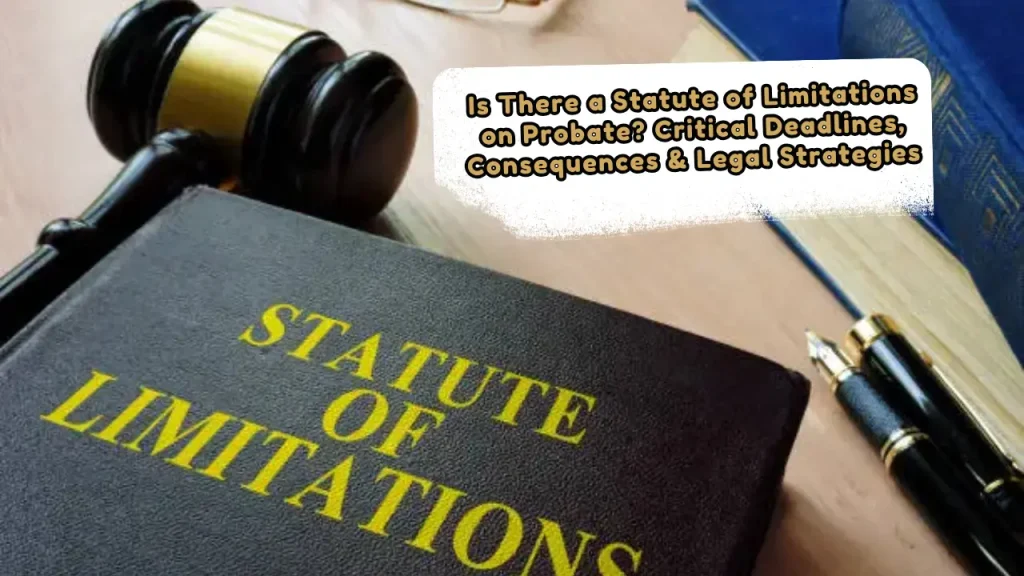Is There a Statute of Limitations on Probate? Critical Deadlines, Consequences & Legal Strategies
Yes, there is a statute of limitations on probate, but deadlines vary by state and the type of claim involved. Most states require probate to be initiated within 1–3 years of death, while creditor claims and will contests often have shorter windows (e.g., 3–12 months). Missing these deadlines can forfeit your rights.
Did you know that 1 in 4 heirs risk losing their inheritance due to missed probate deadlines? Whether you’re settling an estate or contesting a will, timing is everything. Here’s what you need to know to protect your rights.
Table of Contents
Key Probate Deadlines by Category
1. Filing a Will for Probate
While probate itself may have a multi-year window, submitting the will to the court often has stricter timelines:
- California: The will must be filed within 30 days of death, though probate can start later (Probate Code § 8200). Delays may trigger validity challenges.
- Texas: A will must be filed within 4 years of death, but courts can reject late submissions without justification (Estates Code § 256.003).
- Florida: No strict deadline, but formal probate should begin within 10 days if required (Fla. Stat. § 733.212).
- England and Wales: No fixed deadline, but executors risk penalties for unreasonable delays.
Consequences of Delay:
- The estate may default to intestacy (state-determined inheritance), ignoring the deceased’s wishes.
- Late filings in Texas may require court approval after 4 years.
2. Creditor Claims
Creditors must act swiftly to collect debts from an estate:
- Florida: 3 months from published notice or 30 days if directly notified (Fla. Stat. § 733.702).
- New York: 7 months from executor appointment (SCPA § 1802).
- Illinois: 6 months from probate opening (755 ILCS 5/18-12).
- England and Wales: 6 months from probate grant (Inheritance Act 1975).
How It Works:
- Executors must publish creditor notices to start the clock.
- Claims are barred if deadlines are missed, unless notice was defective.
3. Contesting a Will
Heirs disputing a will’s validity face tight windows:
- California: 120 days after probate admission (Probate Code § 8270).
- Illinois: 6 months after probate admission (755 ILCS 5/8-1).
- Florida: 90 days after probate notice (Fla. Stat. § 733.212).
- England and Wales: No fixed limit for validity contests, but financial claims under the Inheritance Act must be filed within 6 months of probate.
Why It Matters:
- Missing deadlines cements the will’s terms, even if flaws exist.
4. Completing Probate
While no strict deadline exists for closing probate, delays have consequences:
- Texas: Executors are encouraged to wrap up within 1 year (Estates Code § 361.151).
- Practical Limits: Courts may remove sluggish executors or penalize the estate for asset depreciation.
- England and Wales: No formal cutoff, but prolonged delays risk beneficiary lawsuits.
Impact of Delay:
- Heir frustration, asset erosion (e.g., unpaid property taxes), or executor liability.
Related article for you:
How to Value a Timeshare for Probate? Everything Executors Need to Know

Consequences of Missing Deadlines
- Late Will Filing: The estate may default to intestacy, bypassing the deceased’s wishes.
- Voided Creditor Claims: Debts are dismissed unless creditors prove improper notice.
- Barred Will Contests: Courts uphold the will, even if flawed.
- Executor Liability: Personal responsibility for unpaid debts or asset losses.
Exceptions:
- Fraud or Concealment: Deadlines extend if fraud is discovered later (e.g., hidden assets).
- Good Cause: Courts may grant extensions for heirs unaware of the death.
State-by-State Reference
| State | Will Filing Deadline | Creditor Claim Window | Will Contest Deadline | Probate Completion Guidance |
| California | 30 days | 4 months | 120 days | 1 year |
| Texas | 4 years | 6 months | 2 years | 1 year (recommended) |
| Florida | 10 days (formal) | 3 months | 90 days | No strict limit |
| New York | 3 years | 7 months | 6 months | Case-dependent |
How to Avoid Costly Mistakes?
- File Early: Submit the will promptly, even if probate starts later.
- Notify Creditors: Use certified mail and newspaper publications.
- Track Deadlines: Use a probate calendar for key dates.
- Consult an Attorney: Understand state laws and exceptions.
Final Takeaway
Probate deadlines are unforgiving but manageable with vigilance. Executors must act swiftly, while heirs and creditors should assert their rights immediately. When in doubt, seek legal counsel—time lost is often rights lost.
Need Help?
- U.S. Resources: Legal Services Corporation for low-cost aid.
- UK Resources: GOV.UK Probate Guide.
By mastering these timelines, you safeguard the estate’s integrity and honor the deceased’s legacy. Don’t let the clock defeat you—act now.
About the Author

Sarah Klein, JD, is an experienced estate planning attorney who has helped clients with wills, trusts, powers of attorney, and probate matters. At All About Lawyer, she simplifies complex estate laws so families can protect their assets, plan ahead, and avoid legal headaches during life’s most sensitive moments.
Read more about Sarah
